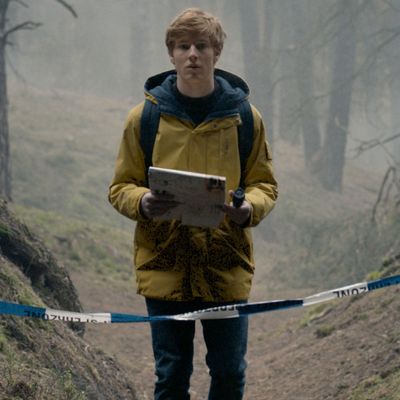
Netflix’s first original German series, Dark, will inevitably be compared to Stranger Things. Both series focus on children who have gone missing; both are set, partially in Dark’s case, in the 1980s; both involve unexplained phenomena that cause lights to flicker, among other things; and both reveal underground pathways that connect to a mysterious facility that’s key to the show’s central mysteries. In Stranger Things, that facility is Hawkins Lab, where scientists have engaged in studies reminiscent of the CIA’s MK-Ultra experiments. In Dark, it’s a nuclear power plant, a nod to the Chernobyl disaster in 1986, which looms over the series in multiple ways.
But Dark, now streaming and presented with English subtitles, is tonally quite different from that show about Dustin and his pet Demogorgon. As laid out by co-creators Baran bo Odar, a Swiss filmmaker, and German screenwriter Jantje Friese, its moods and hues are much more in line with the original French version of The Returned. Every day in Winden, the small German town where Dark takes place, is as gray and overcast as the moods of its characters.
There are a lot of characters to keep track of, which is one of the key challenges in the initial episodes that inevitably suck you in regardless. The show opens with a voice-over explaining that “everything is connected,” which turns out to be true of the relationships between the parents and children in four families that are slowly introduced. First we meet Jonas (Louis Hofmann), a teenager who has spent time in a mental hospital following his father’s suicide and is readjusting to regular life in 2019 when he learns that a classmate, Erik, has gone missing.
A short time later, Jonas and several friends go on a late-night expedition into the Winden woods to see if they can recover some drugs that Erik stashed away in a hiding spot. In the process, a friend’s younger brother, Mikkel (Daan Lennard Liebrenz) disappears. Mikkel happens to be the sibling of Jonas’s ex-girlfriend, and also the son of the police chief, who happens to be having an affair with Jonas’s mother, and I could keep writing this sentence and explaining the web of overlapping relationships in this town, but you get the idea.
With the caveat that it’s best to enter Dark as spoiler-free as possible, I won’t say too much about the role that 1986 plays in the series, other than to say that the drama between its men, women, boys, and girls toggles back and forth between that year and 2019, in ways that support the Albert Einstein quote that flashes onscreen in the pilot: “The distinction between past, present, and future is only a stubbornly persistent illusion.”
If this all sounds cryptic, that’s because it is. Dark is a mystery-box show through and through, complete with secrets and surprising twists and cliffhangers that put a cap on each episode while enticing you to immediately open the bottle of the next one. It is such a mystery-box show that it even features a box, containing the suicide note written by Jonas’s father, and takes several episodes to actually reveal what the letter says. While that might sound frustrating, the thicket of story lines is so intricate that there’s no time to get annoyed when one piece of information takes a while to reveal itself. There are too many other elements of the puzzle to continue trying to sort out.
Like other shows that invite the viewer to try to solve them, Dark suffers a bit in the humanity department. With so many characters, and such attention on how their identities and actions fit into the plot, there isn’t much room to truly get to know these people on a deeper level, at least not in the six episodes that I watched out of the ten total.
The overall vibe is so heavy that watching Dark can be a bit suffocating at times. I’ll also note that this show has never met a portentous moment that it couldn’t make more portentous by unleashing the sound of extremely ominous-sounding strings. If you’re looking for something that’s going to lighten your spirits at the end of a rough week, this isn’t it. But if you enjoy complex mysteries that embrace a sense of melancholy and never let go of it — think not just The Returned, but also The Killing or season one of Top of the Lake — this will be right up your creepy alley and/or shadowy gravel road in the middle of nowhere.
To be fair, every once in a while Dark does exhibit a flash of oddball humor. In the third episode, a medical technician is performing an autopsy on one of several recently expired sheep and chatting with the chief inspector. After announcing that the sheep’s eardrums have ruptured as he examines the fleecy corpse, the technician casually asks: “Coming to our party this weekend? My wife’s making Yugoslavian meatballs.”
It’s a welcome gruesomely playful moment, and one that, yet again, calls to mind another TV series about missing teens in a small town where things just ain’t right. No, not Stranger Things. Twin Peaks.


